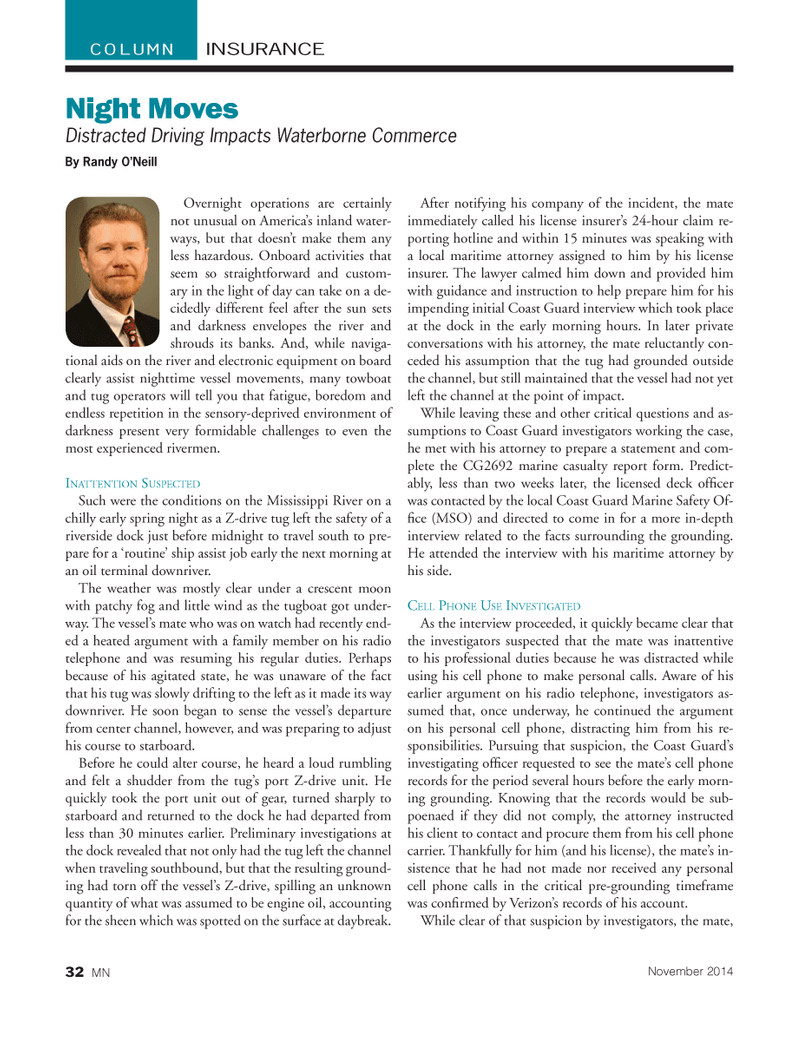
Page 32: of Marine News Magazine (November 2014)
Workboat Annual
Read this page in Pdf, Flash or Html5 edition of November 2014 Marine News Magazine
Overnight operations are certainly not unusual on America’s inland water- ways, but that doesn’t make them any less hazardous. Onboard activities that seem so straightforward and custom- ary in the light of day can take on a de- cidedly different feel after the sun sets and darkness envelopes the river and shrouds its banks. And, while naviga- tional aids on the river and electronic equipment on board clearly assist nighttime vessel movements, many towboat and tug operators will tell you that fatigue, boredom and endless repetition in the sensory-deprived environment of darkness present very formidable challenges to even the most experienced rivermen.
INATTENTION SUSPECTED
Such were the conditions on the Mississippi River on a chilly early spring night as a Z-drive tug left the safety of a riverside dock just before midnight to travel south to pre- pare for a ‘routine’ ship assist job early the next morning at an oil terminal downriver.
The weather was mostly clear under a crescent moon with patchy fog and little wind as the tugboat got under- way. The vessel’s mate who was on watch had recently end- ed a heated argument with a family member on his radio telephone and was resuming his regular duties. Perhaps because of his agitated state, he was unaware of the fact that his tug was slowly drifting to the left as it made its way downriver. He soon began to sense the vessel’s departure from center channel, however, and was preparing to adjust his course to starboard.
Before he could alter course, he heard a loud rumbling and felt a shudder from the tug’s port Z-drive unit. He quickly took the port unit out of gear, turned sharply to starboard and returned to the dock he had departed from less than 30 minutes earlier. Preliminary investigations at the dock revealed that not only had the tug left the channel when traveling southbound, but that the resulting ground- ing had torn off the vessel’s Z-drive, spilling an unknown quantity of what was assumed to be engine oil, accounting for the sheen which was spotted on the surface at daybreak.
After notifying his company of the incident, the mate immediately called his license insurer’s 24-hour claim re- porting hotline and within 15 minutes was speaking with a local maritime attorney assigned to him by his license insurer. The lawyer calmed him down and provided him with guidance and instruction to help prepare him for his impending initial Coast Guard interview which took place at the dock in the early morning hours. In later private conversations with his attorney, the mate reluctantly con- ceded his assumption that the tug had grounded outside the channel, but still maintained that the vessel had not yet left the channel at the point of impact.
While leaving these and other critical questions and as- sumptions to Coast Guard investigators working the case, he met with his attorney to prepare a statement and com- plete the CG2692 marine casualty report form. Predict- ably, less than two weeks later, the licensed deck offi cer was contacted by the local Coast Guard Marine Safety Of- fi ce (MSO) and directed to come in for a more in-depth interview related to the facts surrounding the grounding.
He attended the interview with his maritime attorney by his side.
CELL PHONE USE INVESTIGATED
As the interview proceeded, it quickly became clear that the investigators suspected that the mate was inattentive to his professional duties because he was distracted while using his cell phone to make personal calls. Aware of his earlier argument on his radio telephone, investigators as- sumed that, once underway, he continued the argument on his personal cell phone, distracting him from his re- sponsibilities. Pursuing that suspicion, the Coast Guard’s investigating offi cer requested to see the mate’s cell phone records for the period several hours before the early morn- ing grounding. Knowing that the records would be sub- poenaed if they did not comply, the attorney instructed his client to contact and procure them from his cell phone carrier. Thankfully for him (and his license), the mate’s in- sistence that he had not made nor received any personal cell phone calls in the critical pre-grounding timeframe was confi rmed by Verizon’s records of his account.
While clear of that suspicion by investigators, the mate,
INSURANCECOLUMN
Night Moves
Distracted Driving Impacts Waterborne Commerce
By Randy O’Neill
November 2014 32 MN
MN Nov14 Layout 32-49.indd 32 10/23/2014 10:25:41 AM

 31
31

 33
33
